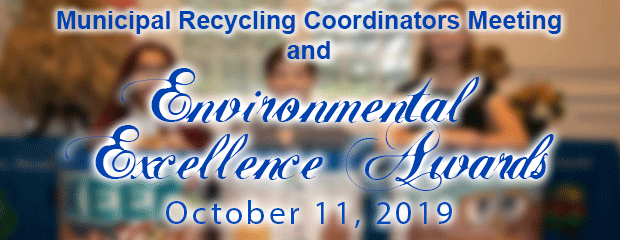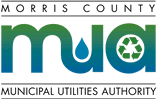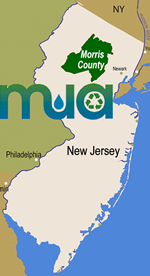Transfer Station Info (Tip Fee $113.00/ton)
- Mt. Olive Mon-Fri 7:30am-3pm; Sat 7:30am-11am
- Parsippany Mon-Fri 7am-3pm; Sat 7:30am-11am
- Closed Sundays and Major Holidays
- No Rental Trucks
- Payment by Account, Check, Credit Card. No Cash

Municipal Recycling
Coordinators Meeting and Awards Luncheon
October 11, 2019
On October 11, 2019 the MCMUA held two meeting where Municipal Recycling Coordinators and Certified Clean Communities Coordinators could receive meeting credits used for their respective recertifications. Please see the sign in sheets below to verify attendance.
Sign In Sheets
Sign in sheets for Municipal Recycling Coordinaotrs (MRCs) and Certified Clean Communities Coordinators (CCCCs), from the MRC Meeting and following Award Luncheon on October 11, 2019 are provided below.
- MRC Morning Meeting Credits - Municipal Recycling Coordinator Sign In Sheet - Certified Recycling Professionals earned 2 classroom recertification credits for attending this meeting.
- CCCC Morning Meeting Credits - Certified Clean Communities Coordinators Sign In Sheet - Certified Clean Communities Coordinators earned 2 Clean Communities Recertification Credits for attending this meeting.
- MRC Awards Luncheon Credits - Municipal Recycling Coordinator Sign In Sheet - Certified Recycling Professionals earned 2 meeting recertification credits for attending the Environmental Excellence Awards Luncheon.
- CCCC Awards Luncheon Credits - Certified Clean Communities Coordinator Sign In Sheet - Certified Clean Communities Coordinators earned 2 Clean Communities Recertification Credits for attending the Environmental Excellence Awards Luncheon.
Municipal Recycling Coordinators Meeting (Morning Session)
There were four speakers at the meeting; Frank Marella, Program Director for MRM; Donna Macalle-Holly, Lake Hopatcong Foundation; Morgan Brown, Student from the Morris County Environmental Science Academy and Eric Gabrielson, Republic Services. Listed below is a summary of the topics they spoke about.
Frank Marella, Program Director for MRM
- Frank spoke about the importance for municipalities who are operating under the County's contract with MRM to follow the guidelines regarding the collection and reporting of electronics. There are 27 towns operating under the MCMUA/MRM program.
- MRM assigns a recycler (Vintage Tech/Kuusakoski; e-Revival), who picks up, transports and recycles the collected electronics. The recycler gives the towns a Certificate of Recycling, which lists all of the weights of the products. The data is used for state reporting.
- MRM completes the semiannual NJDEP reporting form and provides it to each collection site in the program.
- The towns receive the completed report from MRM. They verify that the report is correct by signing it electronically. Then they submit the report to the NJDEP.
- MRM only gets paid if the towns submit their reports to the NJDEP.
- MRM's packing guidelines help the towns maximize the weight for each pickup. MRM would like each pick up of covered electronics to weigh 8,000 pounds (a full truck).
- The MCMUA worked with MRM to provide signage for the collection sites. The signs list the acceptable electronics and provide instruction for placing the e-waste in gaylords or on pallets.
- MRM will work with the collection sites to achieve their goals.
- Click here to download a presentation by Frank Marella of MRM regarding
participating in Morris County's e-Waste program being managed by MRM.
Donna Macalle-Holly, Lake Hopatcong Foundation
- Donna spoke about the Lake Hopatcong lake-wide cleanup conducted on November 3, 2018. The Lake Hopatcong Foundation and Lake Hopatcong Commission hold this event every five years during the time the lake is lowered 60 inches. This lowering allows people to repair their docks and to remove litter and debris from the lakebed. Donna said that the lake covers 600 acres and is surounded by four different municipalities (Jefferson Twp., Hopatcong Borough, Roxbury Twp. and Mt. Arlington Borough), which makes the cleanup a huge undertaking.
- Organizing the cleanup requires obtaining permission from all private home owners and businesses on the lake. Donna mentioned that Roxbury Township mailed letters to all home owners with lake front property to get permission for the cleanup. She really appreciated this help.
- The volunteers are oraganized by selecting team leaders who are in charge of their assigned group members. The Foundation utilized a software program called "Sign-up Genius," which made the job of organizing volunteers a lot easier. There were close to 400 volunteers divided into 54 teams.
- Tires are still commonly used as boat bumpers on docks. As they wear, they fall into the lake and sink to the lakebed. Tires were 8.8% of the litter removed. The tire removal process is a follows: all tires were taken to Lake Hopatcong State Park and then the Bridgestone Company picks them up. Morris County Clean Communities helped to pay for the tires.
- The litter removed from the lake weighed 12,709 pounds. The largest sources of litter were: drink containers, 50.8%; tires 8.8%; caps and lids, 5.4%; wrappers and containers, 4.6/% and plastic bags, 4.1%.
Morgan Brown, Student from the Morris County Environmental Science Academy
- Morgan spoke about remediatons for some types of the litter found in the Lake Hopatcong cleanup. For example, fishing line and lures consisted of 0.9% of the litter removed. The academy students repurposed disinfectant wipe containers to be used as fishing line disposal containers. Fishermen should keep these containers on their boats and put their discarded fishing line in these containers. The lids will keep the line from being blown into the lake. Putting up proper signage to help educate people about the damage litter does to the lake water, fish and animals inhabiting the lake area.
- Create a Sustainable Restaurant Ranking System and rank restaurants by how environmentally conscious their products and practices are. For example a high rank would be given to a restaurant that does not use plastic bags or plastic straws and uses biodegradable take out containers.
- Cigarette debris removed from the lake made up 4% of the total trash collected. Cigarette butts contian toxic chemicals such as aresenic, acetone, ammonia, bnezene, cadmium, formaldehyde, lead and toluene, which leach into the lake water. Josh Martorelli, a student from the Environmental Science Academy, conducted an experiment with cigarette debris. He used two fish tanks containing fish. In one tank he put cigarette butts and the second tank did not contain any butts. After 2 months, the fish is the tank with the cigarette butts had died. The students at the Academy would like to see grant monies made available to restaurants for the purpose of buying more trash receptacles and more cigarette disposal containers.
Eric Gabrielson, Republic Services
- Eric spoke about the downturn the recycling industry has been experiencing and the difficulties material recovery facilities, such as Republic Services, are facing. China's National Sword and ensuing bans on recyclable materials and the strict 0.5 acceptable contamination rate caused the value of most commodities to plummet. It also caused the cost of operations to increase. Despite the difficult times, Eric provided some good news; Republic Services has been able to keep paper moving and now has markets throughout the world. India has grown as a market and China is paying more for paper due to the shortage in China created by their own bans.
- The following three things are important to a MRF; safety issues, elevated residential costs and plant downtime due to damaged equipment. Eric told us about an incident with a laptop battery. Batteries are fire hazards at a material recovery facility. A laptop ended up in the recycling stream and made it to Republic Services. As it was going up the loader, an employee noticed something was smoking. If the employee had not noticed the smoke, a fire could have started in the facility.
- Education is key componet towards eliminating contamination and Eric said that Morris County does an excellent job educating people about recycling. The top two contaminates are mositure and plastic bags. Moisture is the biggest cause of rejected loads and plastic bags drive up operation costs.
- After the Awards Luncheon, I thanked Eric for helping us with all of the tours of Republic Services on behalf of the MRCs. Eric said that he liked giving the tours to the MRCs because it gave him an opportunity to touch base with them.
Environmental Excellence Awards Luncheon (Afternoon Session)
The MCMUA Environmental Excellence Awards Luncheon followed the meeting. An upcycled fashion show included bags made from old t-shirts, by Ina Braun, who was an award recipient. Ina, who is called the Bagtivist, promotes the use of reusable bags in place of single-use plastic bags.
Jack Cocheo, a three-year old boy from Morris Plains Borough, modeled a shirt with a recycling truck on it, and carried a Frisbee made of recycled plastic in the fashion show. In addition, Jack showed off his recycling expertise by sorting through a bag of materials and removed all unacceptable items from those he put into the recycling bin!
The awards event highlighted outstanding environmental achievements by local businesses, those who promote sustainable practices, cleanup litter, reduce- reuse-recycle, and educate the public about proper recycling practices! The award recipients were honored for their accomplishments and attendees learned about these inspiring individuals and the successful programs in Morris County!


